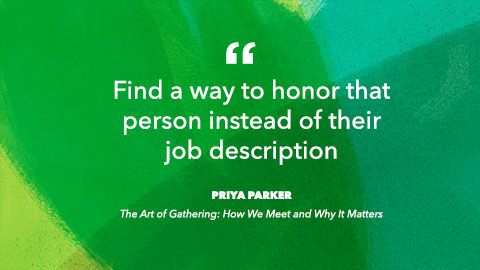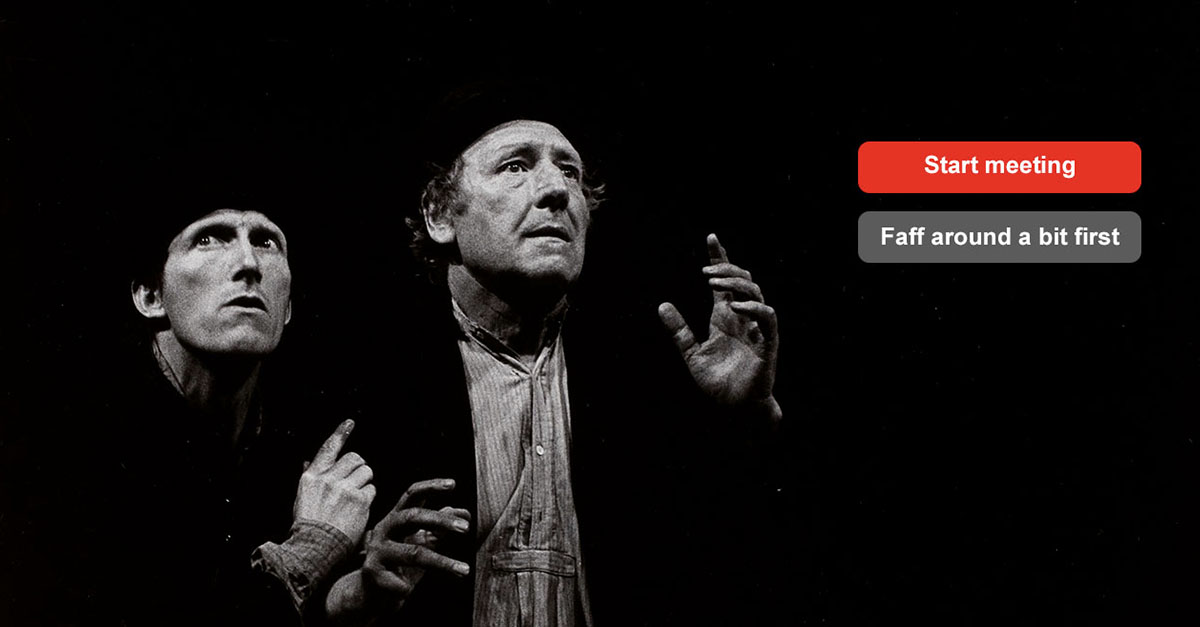Despite lots of great tech and new ways of working online, many online meetings have a long way to go before they're generally bearable, let alone pleasant and productive.
One of my biggest peeves about online meetings is that first 5 minutes.
You've probably been there. You join an online meeting at the time it's meant to start, but there's only you, the organiser, and one or two others. The organiser says something like "Let's wait a few minutes for everyone to join..." And then everyone is in a weird limbo-land of awkward superficial chit-chat. It's full of tension: will you go back to your emails? Or engage in discussion? And will the organiser start, despite some people missing? Or will someone else get frustrated and try to take control by saying that we should get started?
Ugh. These first 5 minutes are like Samuel Beckett's famous play Waiting for Godot, where literally nothing happens. Twice. In both Act I and Act II. The 2 main characters Vladimir and Estragon basically just shoot the breeze, just like we all do in our meetings, for the same reason: "to hold the terrible silence at bay".
It's painful. It's unnecessary. And it's totally avoidable.
Here are 3 things that have worked well for me, that you might like to try.
1. Just start. Really.
Trust is all about saying you'll do something, and then doing it. A great way to inspire trust and respect amongst a team is to set expectations together about the right behaviour, stick to that behaviour, and politely call it out when people don't stick to it.
With this in mind, every meeting invitation you send out is a fantastic opportunity to strengthen trust and respect with the group of people you're meeting with, about what's OK and what's not OK. By this I mean: state in the description that you'll be starting and ending on time.
And when it's time for the meeting to start, start. If you don't, you're not respecting those who have done the right thing and been there on time.
When people come in late (for a range of very valid reasons, I know), say hi, acknowledge them, but move on. Anything more means that you're not respecting those who have done the right thing.
Is this too harsh? Maybe even counterproductive? It all depends on how you start. ;)
Let me explain, in the next 2 ideas...
2. Heighten everyone's appetite for the meeting together
Sure you can spend the first 5 minutes asking each other about how our days have been, or about the previous meeting and so on, to pass the time before a quorum of people show up. And sometimes this is actually better for team morale and cohesion. Or, you can make that 'Waiting for Godot' time more productive by helping everyone get better connected to the intent of the meeting. The time can be more productive by helping each other to be more present, and in a more heightened state for contribution.
Think of it as warming a cold engine. Here are some examples of questions to ask:
- "Just as we're waiting for others to join, what's the main thing you'd each like to get out of this meeting?"
- "I know we're still waiting on a few others, so any ideas about how we might be able to end this meeting a bit earlier?"
- "While we wait for the others to turn up, do you have any questions that'll help us get more out of this meeting?"
Sometimes a meeting really can't start until a specific person is there. We can ask questions like these:
- "While we wait for [the person] to arrive, what's the most important contribution we need from them?"
- "When [so-and-so] turns up, how will we get them up to speed?"
I really dig open questions like these. They help everyone to feel more sense of ownership over the outcomes of your meetings together, and how everyone shows up and works together.
3. Get everyone in the best mindset together
Odds are, people have come from some other work, some other meeting, or a whole slew of back-to-backs. They've got a million and one things on their minds. It can mean a lot to help everyone get into the right mindset first, before launching into the agenda of the meeting.
If you're the meeting organiser, try sharing your screen right at the very beginning, before anyone shows up, with a thought-provoking quote for everyone to ponder or discuss together, that is relevant somehow for the topic of your meeting. It can be a quote like this:

Or a thought-provoking question to answer, like these:
- "What's one word that sums up your week so far?" (for a meeting involving synthesis and analysis)
- "What are you grateful for so far this year?" (for a retrospective meeting)
- "What's one area you'd like to grow in professionally, while doing this project?" (for a project planning meeting)
#plug: you can find heaps of these thought-provoking openers at remotefriendlyicebreakers.com.
What about those who turn up late, and miss out on this part? That's OK. They haven't missed the meeting as such; just the warming-up-the-engine part. They'll pick up on the positive energy in the group that has been generated in that first 5 minutes, and hopefully read it as a signal to try to turn up on time, next time.
That first 5 minutes is such a huge opportunity to really brighten everyone's lives, spark their imagination, and get their brains crackling. It's too good an opportunity to waste. Speaking of quotes, here's another great one by Priya Parker:
"Your opening needs to be a kind of pleasant shock therapy. It should grab people. And in grabbing them, it should both awe the guests and honor them. It must plant in them the paradoxical feeling of being totally welcomed and deeply grateful to be there."
